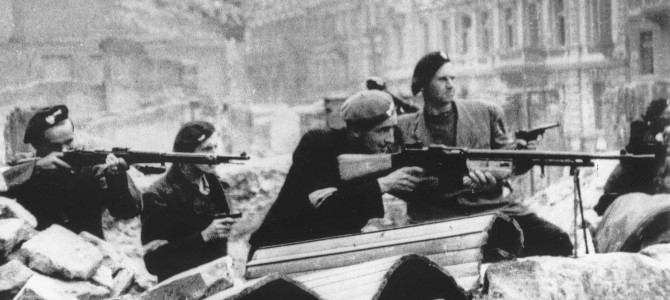The contention by Ben Carson that the Holocaust could have been “greatly diminished” has now been classified as anti-Semitism by people who can’t answer a simple question about guns and would rather whitewash the obvious lessons of history than debate them.
For what it’s worth, my Jewish family is from Eastern Europe, and there are plenty of Holocaust stories to tell. I’m somewhat uncomfortable with the idea of using that gruesome event to make a point about guns—or anything else, for that matter— because we’re dealing with a different place, time, and a very uniquely evil set of circumstances. The mere mention of “Holocaust” ignites an emotional response that precludes the slim chance of a reasonable debate breaking out. Anyway, alternative histories are usually a waste of time. This one is probably no different.
Twitter is good for so much but I can do without the jerksplaining about how my relatives were gassed because they were wimps.
— Michael Grunwald (@MikeGrunwald) October 12, 2015
None of this, however, makes the broader point about totalitarians and guns any less true. There are dozens of examples in the 20th century of tyrannies disarming a citizenry and then eventually leading those people to slaughter or starvation—including China, Rwanda and basically every autocracy that’s existed. You don’t even have to mention Nazis to highlight this fact: an unarmed citizenry is easier to control. That should be easy thing to concede. That doesn’t mean all nations that have unarmed citizenries will be massacred or lose all their rights. But, just in case, many Americans believe that citizens have a foundational right to arm themselves.
Sean, how many relatives did you lose in the Holocaust? https://t.co/sNjAhToOBd — Glenn Thrush (@GlennThrush) October 12, 2015
Does this argument about history tell us anything about the contemporary debate about guns? I’m not sure. Does a 1934 Germany with a Second Amendment mean that the Holocaust would not have happened? Of course not. If conservatives have a bone to pick with Carson—whose reductive offerings can often obscure some reasonable idea—it’s his use of the word “greatly.”
David Kopel has written extensively about Jewish partisans, the Warsaw Ghetto Uprising, and others who defended themselves during World War II, for years. They exist. Their bravery, or survival, doesn’t make the other Jews “wimps.” It also doesn’t make the Jews who could get their hands on guns and fought back any less real. Though an imperfect example, in 1948, Jews proved they could avoid destruction when armed. Certainly if the Mufti had anything to say about it history would have been different.
 And trying to understand all moral dimensions of the Holocaust doesn’t make you a bigot. My entire life I’ve heard people struggle to comprehend how millions of Jews could voluntarily line-up and march to their deaths. It’s certainly not a new thought. Nor is it by default an anti-Semitic one. I’ve heard many Jews wonder about it. Some people have trouble grasping circumstances of another age through the prism of their own experiences.
And trying to understand all moral dimensions of the Holocaust doesn’t make you a bigot. My entire life I’ve heard people struggle to comprehend how millions of Jews could voluntarily line-up and march to their deaths. It’s certainly not a new thought. Nor is it by default an anti-Semitic one. I’ve heard many Jews wonder about it. Some people have trouble grasping circumstances of another age through the prism of their own experiences.
You might disagree with framing of the debate. That’s fine. But on what grounds could anyone consider Caron’s assertion—or any of those who defend him—anti-Semitic? Arguing that people who have guns make it more problematic to be slaughtered by tyrants seems to suggest the opposite of “wimp.” In fact, in some sense the idea is exactly what rallied people behind “Never Again” and the modern Israel state. Whether you get your historical equivalences exactly correct or not, the idea that victims should be able to defend themselves against tyranny is empowering, not hateful.









